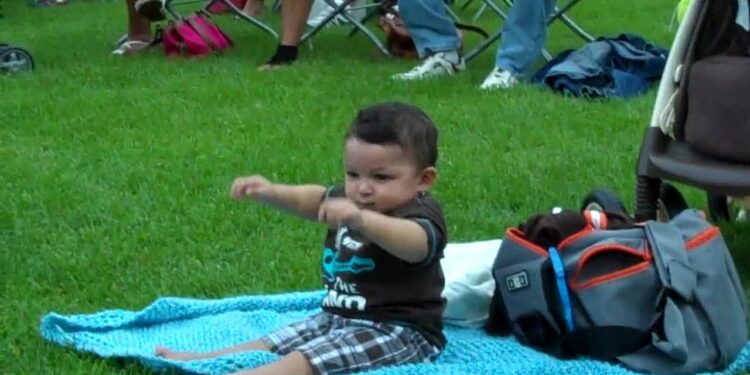Table of Contents
- Average age when babies start clapping Most babies are able to clap around 9 months, after they’ve mastered sitting up, pushing and pulling themselves up with their hands, and pre-crawling
- (All that upper body strength helps them have the coordination to clap, too)
Then, Why do babies love dancing? Babies love a beat, according to a new study that found dancing comes naturally to infants The research showed babies respond to the rhythm and tempo of music, and find it more engaging than speech
What age does baby give kisses? 10 to 12 months You’ve sent plenty of smooches your baby’s way
in the same way, What should baby be doing at 8 months? At 8 months old, your baby may be already crawling or learning how to crawl, moving from seated to all fours and back again, and pulling themselves up to a standing position Some ambitious babies may even be “cruising” – attempting to take their first wobbly steps while holding onto furniture
What do 8 month olds do? By this age, most babies can roll over in both directions — even in their sleep Some babies can sit on their own, while others need a little support You might notice your baby beginning to scoot, rock back and forth, or even crawl across the room Some babies this age can pull themselves to a standing position
Why do some babies dance to music?
A study based on babies aged between five months and two years old, found that humans may be born with a predisposition to move rhythmically in response to music According to the findings, babies respond to the rhythm and tempo of music, and they find it more engaging than speech
Do babies understand kisses?
Around the 1-year mark, babies learn affectionate behaviors such as kissing It starts as an imitative behavior, says Lyness, but as a baby repeats these behaviors and sees that they bring happy responses from the people he’s attached to, he becomes aware that he’s pleasing the people he loves
What does baby dance mean?
Baby Dancing (BD’ing) is a term used to describe having unprotected sex with the intention of getting pregnant, ideally when you’re most fertile, to improve chances of conceiving You and your partner get to “dance” your way to pregnancy—and you don’t even need any music to make it work
What 8 months baby can do?
At this age your baby might also:
- copy sounds
- make noises to get your attention
- explore everything around them – for example, they might ring bells, bang blocks and find hidden objects
- stop what they’re doing when they hear you say ‘no’
- practise their eating skills by holding, biting and chewing food
How can you tell if a baby has autism?
Signs of autism in young children include:
- not responding to their name
- avoiding eye contact
- not smiling when you smile at them
- getting very upset if they do not like a certain taste, smell or sound
- repetitive movements, such as flapping their hands, flicking their fingers or rocking their body
What milestones should a 8-month-old be doing?
8-month-old milestones
- Crawling Your baby will likely start crawling soon after they’re able to sit well without support
- Standing
- Having a “lovey” Soon, your baby may develop an attachment to a special blanket, toy, or stuffed animal
- Saying words
- Increased motor control
- Pointing
How do I know if my 8-month-old has autism?
Rarely smiles when approached by caregivers Rarely tries to imitate sounds and movements others make, such as smiling and laughing, during simple social exchanges Delayed or infrequent babbling Does not respond to his or her name with increasing consistency from 6 – 12 months
Can you detect autism at 8 months?
The Centers for Disease Control and Prevention (CDC) note that a baby can show signs of ASD from the age of 9 months However, the Autism Science Foundation states that early signs of ASD may appear in babies as young as 2 months of age
Do autistic babies smile and laugh?
Autistic babies, will usually not smile or react during gameplay Another key development point that might be missing in autistic infants is turning to locate sounds they’re hearing, and also doing things to get attention from you
Do autistic babies laugh?
Children with autism mainly produce one sort of laughter — voiced laughter, which has a tonal, song-like quality This type of laughter is associated with positive emotions in typical controls In the new study, researchers recorded the laughter of 15 children with autism and 15 typical children aged 8 to 10 years







